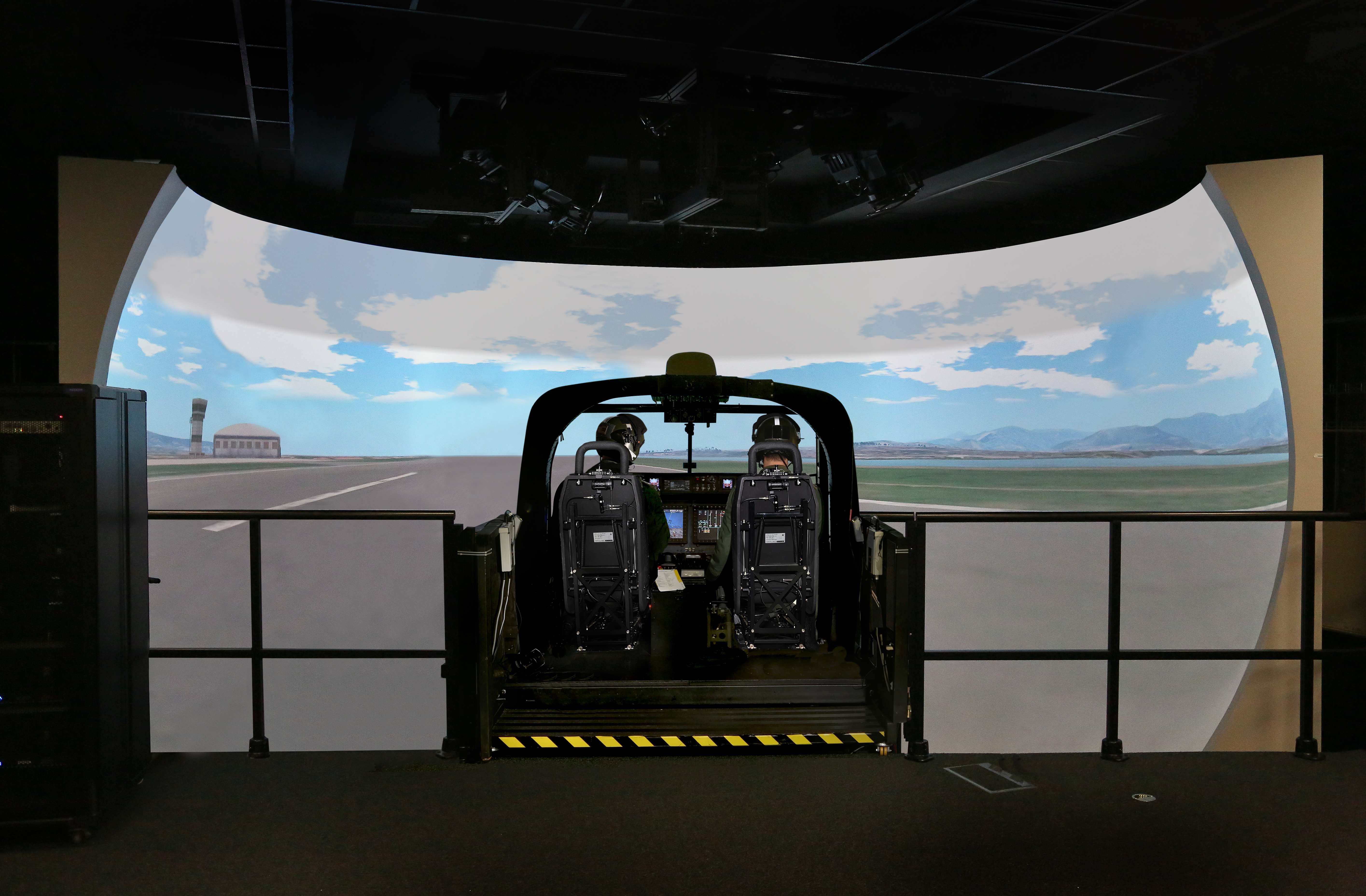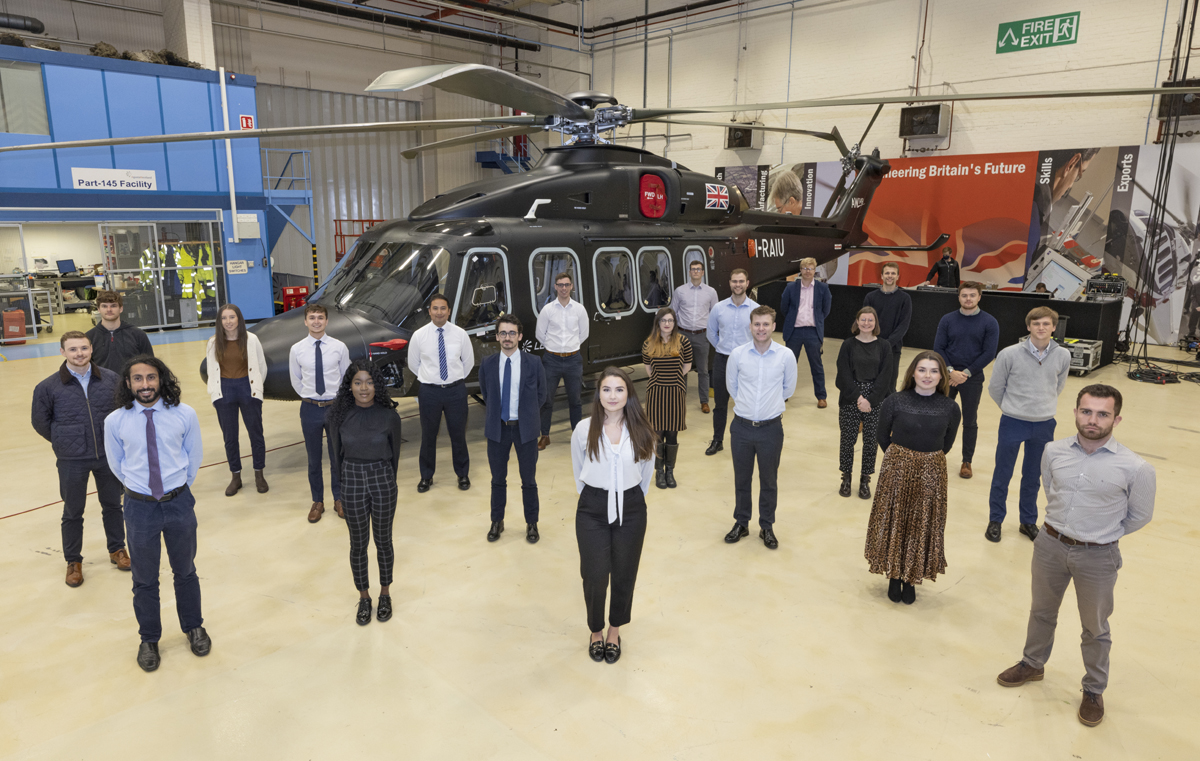Ready for 2025
“Why do we talk about Yeovil being the ‘Home of British Helicopters’?” asks Mike Overd, whose career spans four decades at Leonardo in Yeovil. “Simply because Leonardo is one of very few organisations in the world, and the only one in the UK, with an end-to-end capability. End-to-end means the design, development, manufacture, testing and certification of helicopters, as well as the subsequent training and support for customers.”
Leonardo has been delivering helicopters from its Yeovil site since the 1940s. Over the last ten years, on average – with the UK MOD and international customers – the company has introduced into service, one mark of aircraft a year. The current UK MOD fleet of helicopters consists of around 220, and 139 of these aircraft started life in Yeovil.
Mike continues: “With the capability we have in Yeovil and with our existing UK MOD relationship, we are able to move at pace and could progress the New Medium Helicopter (NMH) aircraft into service within the 2025 timeframe.”
Manufactured in the UK
From the outset, the development of the AW149 has been shared between Leonardo’s helicopter facilities in Yeovil and Milan. During its development phase, over 800,000 hours of engineering activity were clocked up in Somerset, which equates to an equivalent of 50 person years of engineering activity.
“The majority of the structural, main rotor and tail transmission design was undertaken in the UK, and because of that engineering investment, the design of the fuselage and build of blades and transmission is still onsite in Yeovil today. Therefore, in terms of AW149 development, we have integrated expertise at the Yeovil site that continues to this day,” states Mike.
The AW189 civil helicopter was developed after the AW149 and was designed specifically for the commercial market based on the common platform which originated from the AW149. Both aircraft share the same external footprint, common engines, drivetrain and blades, Digital Automatic Flight Control System (DAFCS) and Flight Management System (FMS), amongst other capabilities.
He continues: “The AW189 was selected for the UK search and rescue contract in 2014-15, so for us, it is not about establishing a new line; it is about re-establishing an existing build line. This gives us the advantage of being able to move at pace and to deliver the aircraft from Yeovil within the timeframe that the UK MOD is anticipating.”
Leonardo has stated that should the UK MOD acquire the AW149 for the NMH requirement, the company’s target is to grow existing production workshare levels of the platform to over 60%. This will be supported by an expansion of the UK supply chain.
Leonardo in Yeovil has an established UK supply chain with 70 strong suppliers spread across the union. The company sees the NMH opportunity as a way to grow that footprint further.
Military first
The AW149 was designed at the outset as a military product.
The skills that Leonardo has in Yeovil support the UK MOD’s necessity to have Freedom of Action and operational advantage. The company has a proven ability to support Urgent Operational Requirements (UORs) that enable to the UK MOD to procure quickly additional capability that they might require when moving into active theatre.
“The fact that we can do that locally means we can respond in a very quick timescale. We view ourselves as a supporter of onshore capability and put the UK MOD’s requirements at the height of our priority list,” says Mike.
To give some context to this close working relationship, during Operations Telic and Herrick, Leonardo was involved in more than 50 UORs. These were across defensive aids suites, weapons installations, performance, installing uprated engines and communications, and were not exclusive to the Leonardo designed platforms. The UK MOD also came forward for support on other platforms, such as the Chinook and Puma.
Mike adds: “If we are successful with the NMH requirement, we have all the core rotary wing skills and facilities to support any such UK modifications.”
Ready to Support
A key benefit is our proximity to the UK MOD customer onshore. “We have Test Pilots at Leonardo in Yeovil who have served and probably flown in the aircraft type that is being replaced. This means Leonardo has that operational understanding of what is being conducted today and what the operator might want to do in the future,” comments Mike.
“One of the critical factors in achieving a Release to Service (RTS), is the certification and we’ve been through the UK MOD Military Air Systems Certification Process (MACP) recently with both Crowsnest and the Merlin Life Sustainable Programme (MLSP) aircraft. This means we are well practised in delivering the evidence MOD requires to grant the RTS in a swift and effective manner. We’ve also obviously undertaken the same procedure for the Future Anti-Surface Guided Weapon (FASGW) UK modification to Wildcat.”
There is an expectation that the NMH requirement must comply with the UK Defence Standards requirements – something Leonardo has a deep understanding of. In Yeovil, the company has the full scope of approvals to design and develop aircraft.
The company has Design Approved Organisation Scheme (DAOS) accreditation from the UK Military Airworthiness Authority which covers the complete system design including the assurance of airborne software. There is a significant team in Yeovil writing critical airborne software – it is important to note that the company is a software house as well as an airframe design authority.
Mike explains: “Often it’s more expedient and cost-effective for the taxpayer, for us to make a change to our aircraft rather than get the equipment manufacturer to deliver something to spec.
“This is one of the benefits of our end-to-end capability and we exercise it quite often. We are used to doing this; we are not starting from a position of not understanding how to do this. So when we look at the NMH requirement and we say we can deliver those outcomes in that period of time, it’s through that lens. It’s not just about building a product; it’s about delivering something that is certified too.”
In order for Leonardo to do so, it needs a good solid cohort of specialist design engineers. This means that the company can provide a direct service to the customer’s platforms and have face-to-face interaction.
Many of Leonardo’s engineers are co-located with the customer’s delivery teams, which enables immediate communication and means we can be more responsive to what the UK customer wants.
Training
Leonardo has the capability to offer training as part of its end-to-end capability. Whether it is simply delivering the front-end courseware and training devices or delivering a full turnkey solution as it does for the British Army’s and Royal Navy’s AW159 Wildcat.
“We run high fidelity, full physics flight performance models of our aircraft, and we now have the capability of flying those simulations in the ‘flow field’ around virtual ships decks. This means a pilot flying in our simulator will see very quickly the effect of flying in the air-wake from different types of ships. We can take either the UK MOD’s flow field projections or do our own using Computational Fluid Dynamics and find out,” says Mike.
The company’s simulation capability has been validated by flight tests, as Mike continues to explain: “Our aircrews – who have undertaken ship trials and flown our aircraft onto the Queen Elizabeth aircraft carrier and onto Type 23s – contribute to our simulations, ensuring that UK models created in collaboration with our professional partners, such as Liverpool University, are based on data that is accurate, both quantitatively and qualitatively. And that’s all down to our integrated capability.”
The simulator in Yeovil is accredited as a Flight Training Simulator and a second simulation cell has just been commissioned on-site.

A generation of a unique set of skills
The regulatory approvals and capabilities that Leonardo holds and that allow operational advantage and Freedom of Action, provide solid foundations to experiment, innovate and develop new capabilities for the UK customer. It also means Leonardo can maintain a highly skilled workforce in the UK – not just today, but also offering career paths and development for the next generation of engineers, enabling the company to maintain and develop the UK’s rotary skill base. Furthermore, it allows Leonardo to remain at the forefront of next generation rotary wing capability.
Mike adds: “Something like that cannot be developed overnight, so if you lose it, it’s lost. You won’t be able to recover it from a flow of undergraduate study from the universities.
“We’ve had several independent reviews and worked with UK MOD to understand the depth of knowledge that we have here in Yeovil. Independent analysis agencies reviewed what base of skills you need to support MOD requirements. The conclusion was that you need about 89 separate rotorcraft skills, which equates to a minimum viable size in engineering of around 400 engineers.
“To sustain onshore end-to-end capability or to establish an onshore capability is not something that can be achieved in a short period of time. It takes decades to build the skill sets, the processes, the tools, the infrastructure etc.”

Social Value for the region and for the UK
The NMH opportunity allows Leonardo to sustain the design skills within the UK and is not limited to Yeovil, since it extends to the UK-wide supply chain.
Mike confirms: “For us, it is about sustainable Social Value. That is not about just establishing a build line, skills and support for the NMH, but also about subsequent exports. Our analysis indicates that there’s an addressable global market of over 500 aircraft. And there’s a commitment from the business that should the UK MOD acquire the AW149 as the NMH solution, we will build the resulting export products from the UK – it becomes a virtuous circle.”
A partner for life
So rotary wing development is really difficult. Leonardo’s engineers must deal with unique and challenging engineering problems and component types. If there’s any unforeseen dynamic stability or handling problems, the company has the skills to solve it. Leonardo’s specialist design skills are essential to future UK participation in next generation platforms.
For the UK MOD, this will mean that they have the right equipment, training and support through-life for the service’s needs, and Leonardo is uniquely placed to help, because with an active helicopter production line in Yeovil, the company will be able to deliver AW149 helicopters by the required in-service date.

